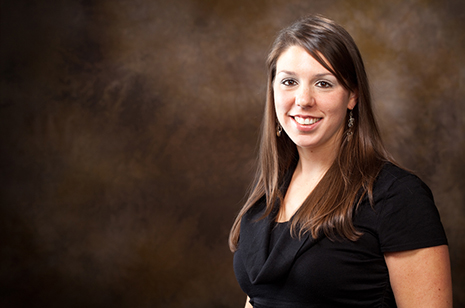Research: Genders Communicate Consent to Sex Differently
FAYETTEVILLE, Ark. – A University of Arkansas researcher’s work on the way men and women communicate their consent to have sex could lead to improved sexual assault prevention programs on college campuses.
Kristen Jozkowski, assistant professor of community health promotion in the College of Education and Health Professions, surveyed 185 students at Indiana University, where she earned a doctorate in health behavior. She wanted to examine how college students define consent and how they express and interpret consent in real-life sexual interactions.
Her study found that the use of nonverbal cues to interpret consent to sexual intercourse could lead to miscommunication and, in some cases, could result in unwanted sexual advances and sexual assault. She found significant differences in how men and women communicated their consent to intercourse with women using more verbal strategies and men using more non-verbal strategies. She found men also relied more on non-verbal indicators when interpreting their partner’s consent and non-consent than women did.
“The ways men and women look for cues to indicate consent and interpret them differs and this could potentially lead to unwanted sex,” Jozkowski said. “We all talk in code.”
For example, when she conducted interviews with college students, Jozkowski said, a male participant described how college students communicate in code. He indicated that he may ask a woman to come to his house and watch a movie. Because of the context of their relationship and the timing of the invitation, he may interpret that invitation as an invitation for sex. In a different context with potentially a different woman, he may just mean watching a movie.
Analyses of how participants actually communicated and interpreted consent suggested that many college students, despite defining consent as an explicit communication of agreement, often use consent signals that are less clear than providing explicit permission or saying yes, Jozkowski found. Sexual assault prevention education that addresses gender differences in consent communication may help men and women see the value in direct, verbal communication of consent, she said.
“They are saying something, but meaning something else, and they think the intended message is well understood given other contextual cues,” Jozkowski said. “But what is really going on from our analyses is that men and women have disjunctive views of consent. Both think they understand each other but really the two (men and women) have different understandings of what these codes mean.”
Many sexual assault prevention efforts focus on clear communication of consent as a way to reduce sexual assault but little research examines how heterosexual college students conceptualize sexual consent, she said. Most colleges and universities provide sexual assault prevention education to students but incident rates have not fallen over the past 50 years.
Jozkowski is lead author of “Gender Differences in Heterosexual College Students’ Conceptualizations and Indicators of Sexual Consent: Implications for Contemporary Sexual Assault Prevention Education” scheduled to be published later this year in the Journal of Sex Research and “College Students and Sexual Consent: Unique Insights,” also scheduled to be published next month in the Journal of Sex Research and currently available online.
Topics
Contacts
Kristen Jozkowski, assistant professor of community health promotion
College of Education and Health Professions
479-575-4111,
kjozkows@uark.edu
Heidi Wells, content writer and strategist
Global Campus
479-879-8760,
heidiw@uark.edu
Headlines
U of A's Inspirational Chorale Makes Its Carnegie Hall Debut
The U of A's Inspirational Chorale took center stage at Carnegie Hall in March, performing under the direction of professor Jeffrey Murdock to a packed audience at the iconic Stern Auditorium.
The State of Economics With Mervin Jebaraj Set for June 5
U of A economist Mervin Jebaraj will analyze state's economic trends and regional issues in an upcoming talk. Preregistration is required by May 31.
Faculty Demonstrate Dedication to Student Success Through Teaching Credentials
Eight faculty members from across the U of A have earned the prestigious Association of College and University Educators certification in Effective College Teaching.
Artificial Intelligence, Machine Learning Boost Arkansas Animal Science Research
Aranyak Goswami, a bioinformatics specialist, will work with three different departments to boost the research arm of the U of A System Division of Agriculture.
College of Education and Health Professions Doctoral Student Picked for Grosvenor Fellowship
Jessica Culver, a doctoral student in the College of Education and Health Professions Adult and Lifelong Learning program, has been selected as a member of the 2024 Grosvenor Teacher Fellowship.





